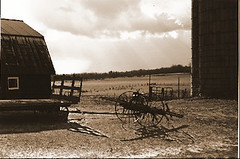The Three Burials of Melquiades Estrada (2005)
Dir. Tommy Lee Jones
Writ. Guillermo Arriaga
w/ Tommy Lee Jones, Barry Pepper, Julio Cedillo, Melissa Leo, Dwight Yoakam, January Jones
Tommy Lee Jones's first go in the director’s seat smacks all at once of John Sayles's Lonestar, Clint Eastwood's Unforgiven, and Sam Peckinpah's Bring Me the Head of Alfredo Garcia. Like Sayles, Jones distills a classic Western theme and relocates it in a modern setting, reincarnating (and also starring as) the lone cowboy who (like Eastwood's William Munny) makes justice his bedfellow to right the negligent death of his friend, Melquiades. A frustrating border problem looms in the background of small-town Texas. Border patroller Mike Norton (Barry Pepper) exhibits an unexplained rage towards the illegal immigrants he gets paid to simply chase back into Mexico; and, later on, a peccadillo that results in Melquiades’s death. When the Texas Rangers, the local police, and the border patrollers won’t investigate, modern-day cowboy Pete Perkins takes it upon himself to see his personal brand of justice done and his friend’s body home.
More than one reviewer has suggested that Eastwood may have been the only other man who could have pulled this part off, but the film engenders doubts that he would have been the right hombre. Jones's tired visage greets the camera like cold bacon and eggs. The aging Texan plays Pete with an easy gravitas, loose in the saddle and patient to make good on a promise to an exile. The film never spells out why the Mexican could not go home, but rather delivers us into the hands of a man willing to wait for something good. The cowboy mystique revels in solitude, men of few words, and calculated actions. Their bond manifests in a series of quiet, lucid flashbacks that culminate when Melquiades asks his only friend to find his wife and family should he die while still in Texas.
“I don’t want to be buried under a billboard,” he tells Pete.
Pepper plays the emotionally distant border patroller just so, too disaffected to notice his bad marriage, and too out of control to stop beating would-be immigrants at his day job. The officials try to get Mike to stop brutalizing Mexicans, but show serious disinterest in Melquiades’s death. As the tight-lipped sheriff, Dwight Yoakam regurgitates incredible talent for the loathsome (think Slingblade) and faces off with Pete over what he dismisses as "just another wetback." Not willing to compromise as filmmaker or hero, Jones takes his character south of the border, hauling along Norton and one very rancid corpse.
Writ. Guillermo Arriaga
w/ Tommy Lee Jones, Barry Pepper, Julio Cedillo, Melissa Leo, Dwight Yoakam, January Jones
Tommy Lee Jones's first go in the director’s seat smacks all at once of John Sayles's Lonestar, Clint Eastwood's Unforgiven, and Sam Peckinpah's Bring Me the Head of Alfredo Garcia. Like Sayles, Jones distills a classic Western theme and relocates it in a modern setting, reincarnating (and also starring as) the lone cowboy who (like Eastwood's William Munny) makes justice his bedfellow to right the negligent death of his friend, Melquiades. A frustrating border problem looms in the background of small-town Texas. Border patroller Mike Norton (Barry Pepper) exhibits an unexplained rage towards the illegal immigrants he gets paid to simply chase back into Mexico; and, later on, a peccadillo that results in Melquiades’s death. When the Texas Rangers, the local police, and the border patrollers won’t investigate, modern-day cowboy Pete Perkins takes it upon himself to see his personal brand of justice done and his friend’s body home.
More than one reviewer has suggested that Eastwood may have been the only other man who could have pulled this part off, but the film engenders doubts that he would have been the right hombre. Jones's tired visage greets the camera like cold bacon and eggs. The aging Texan plays Pete with an easy gravitas, loose in the saddle and patient to make good on a promise to an exile. The film never spells out why the Mexican could not go home, but rather delivers us into the hands of a man willing to wait for something good. The cowboy mystique revels in solitude, men of few words, and calculated actions. Their bond manifests in a series of quiet, lucid flashbacks that culminate when Melquiades asks his only friend to find his wife and family should he die while still in Texas.
“I don’t want to be buried under a billboard,” he tells Pete.
Pepper plays the emotionally distant border patroller just so, too disaffected to notice his bad marriage, and too out of control to stop beating would-be immigrants at his day job. The officials try to get Mike to stop brutalizing Mexicans, but show serious disinterest in Melquiades’s death. As the tight-lipped sheriff, Dwight Yoakam regurgitates incredible talent for the loathsome (think Slingblade) and faces off with Pete over what he dismisses as "just another wetback." Not willing to compromise as filmmaker or hero, Jones takes his character south of the border, hauling along Norton and one very rancid corpse.
Guillermo Arriaga's dialogue alternately tarnishes and shines. At once, he paints the scenery of the lonestar state with industry and a macabre claustrophobic sense pungent with wit. Norton's estranged wife, Lou-Ann, (Melissa Leo) describes her old home of Cincinatti to the curious waitress (January Jones) who notices her boredom. "Yeah, it's really pretty,” Lou-Ann says, childishly believable. “I love the malls."
A lot could be said of the Amores Perros and 21 Grams writer; he's come a long way, and so has Melquiades. In a raw moment between Pete and corpse, he gives up trying to brush his loosening hair, shakes his head, and says, "You look like hell, son." But it's not all squeaky one-liners and juxtapositions. Both Arriaga and Jones let the landscapes speak volumes. The town they seek, described as having so much beauty one could die for it, may only be a myth, but it takes shape and meaning of its own. In their search for Jiminez, no one can guide them…except for Melquiades maybe. And he isn’t talking.
Supporting the weight of such an allegory, cinematographer Chris Menges and music director Marco Beltrami delicately imbue the film with life. In the search for something as eternal yet fleeting as a wellspring, a tree, and a bit of rock, such delicacy should be admired. One part Greek tragedy to two parts discovery, Three Burials has won Jones Best Actor at Cannes, and Best Screenplay for Arriaga, both honors well deserved. But the greatest aspect of the film remains the wonderfully indie imperfections. The honesty has so much rust that it delights where others fail. Artless manipulation, rising musical scores, and cheap camera tricks can be found elsewhere. Character and setting provide really great movement, true, but had Pete Perkins's aim been that of a man intent upon fulfilling his friend's request simply because he deserves no less than a white man, Three Burials would likely be a different movie altogether.
Not a feel-good morality tale, and not about everything that’s wrong with the world, the story centers on the mystery of a life, which serves the film better than hidden motives. A promise made by one man to another while alone on the range one soft, summer day makes good and to great effect, waking Norton from his trite, unreal sense of life and providing a noteworthy emotional payoff. The film's catharsis rings as replete as that of its travelers, a sweet, forgotten sound. In a medium of formulaic plots, snoring sequels, and just plain bad re-runs, it’s refreshing, and unlikely to be seen again soon.















0 Comments:
Post a Comment
<< Home